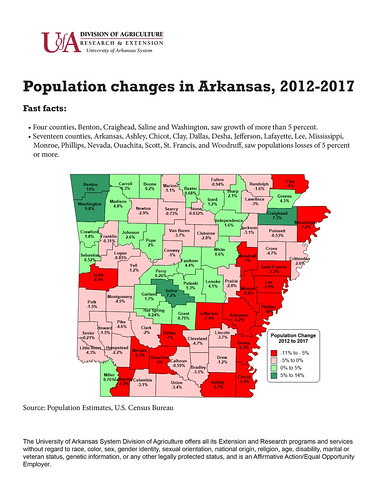Two-thirds of Arkansas’ counties lost population: What are the consequences?
May 21, 2018
By Mary Hightower
U of A System Division of Agriculture
Fast facts:
- Census: 89 percent of counties lagged behind national growth rate
- Fewer people can lead to weaker tax base, less investment in communities
(701 words)
(Newsrooms: with map showing growth and declines according to the Census; https://flic.kr/p/261SECn )
Download Word version.
LITTLE ROCK – Two-thirds of Arkansas’ counties lost population between 2012 and 2017 and 89 percent of Arkansas’ counties lagged behind the national growth rate, according to the latest Census.
Those losses could have lasting consequences for many Arkansas communities, said Mark Peterson, professor in extension community and economic development for the University of Arkansas System Division of Agriculture. Peterson’s work focuses on helping communities and regions reawaken their economies by looking at their assets in new ways.

According to the Census, only four counties, Benton, Craighead, Saline and Washington, saw growth of more than 5 percent. Seventeen counties, Arkansas, Ashley, Chicot, Clay, Dallas, Desha, Jefferson, Lafayette, Lee, Mississippi, Monroe, Phillips, Nevada, Ouachita, Scott, St. Francis, and Woodruff, saw populations losses of 5 percent or more.
Less population will translate into a both a weakened tax base and less investment by public and private entities in infrastructure, and other aspects that make communities strong and stable, he said.
“We have a development spiral model that shows the factors that go into communities on the rise and those that are on the decline,” Peterson said. “Declining communities will see a cycle of that includes less public and private investment, will have fewer jobs or lower paying jobs, a diminished workforce and diminished quality of life.”
The good news, Peterson said, is that today’s economy offers opportunities that could only be imagined two decades ago.
“The 21st century economy is global. It is digital. And it is fast. It is also disruptive and what worked even four or five years ago may not be working as well today,” he said. “The 21st centry economy is loaded with opportunities for communities and regions that understand the key drives of change and how to take advantage of those drivers.”
That, he said. “is important so that communities do not experience further decline.”
Breakthrough Solutions
Breakthrough Solutions, a program of the University of Arkansas System Division of Agriculture with partners in the public, private, and non-profit sectors, is devoted to equipping Arkansas communities, counties, and regions to become vibrant and sustainable in the 21st century economy. Over the years, Breakthrough Solutions has worked with the communities of Harrison, Cleveland County, Berryville, Manila, and several other communities to bring people together, identify fresh opportunities, and launch a revitalization process to realize their desired future.
These opportunities will be explored more fully in the 2018 Breakthrough Solutions Conference and Pre-Conference Workshop on June 6-7. With the theme “Strengthening the Opportunity Pipeline of Your Community / Region”, the conference will feature Liesl Voges, director of the Iowa Great Places Program as keynote speaker.
“Turn Around Communities in the 21st Century Economy” is the theme of the pre-conference workshop and will feature a turn-around community story from Missouri with six key elements, a panel of community leaders with turn-around experience, and action planning to develop turn around strategies for one Arkansas community.
New technologies are another important economic driver, so the conference will include a virtual reality demonstration for tourism, a robot, and a certified drone pilot.
Breakthrough Solutions is a partnership program of the University of Arkansas System Division of Agriculture, housed in the Cooperative Extension Service. Our Breakthrough Solutions partners have pulled together a terrific conference and we invite community and regional leaders to join us. You can learn more and register online at www.bit.ly/BTSConference2018.
For more information about community and economic development within the Division of Agriculture, contact your county extension office or visit www.uaex.uada.edu.
About the Division of Agriculture
The University of Arkansas System Division of Agriculture’s mission is to strengthen
agriculture, communities, and families by connecting trusted research to the adoption
of best practices. Through the Agricultural Experiment Station and the Cooperative
Extension Service, the Division of Agriculture conducts research and extension work
within the nation’s historic land grant education system.
The Division of Agriculture is one of 20 entities within the University of Arkansas System. It has offices in all 75 counties in Arkansas and faculty on five system campuses.
The University of Arkansas System Division of Agriculture is an equal opportunity institution. If you require a reasonable accommodation to participate or need materials in another format, please contact Mark Peterson, 501-671-2253 or mpeterson@uada.edu, as soon as possible. Dial 711 for Arkansas Relay.
# # #
Media Contact: Mary Hightower
Dir. of Communication Services
U of A System Division of Agriculture
Cooperative Extension Service
(501) 671-2126
mhightower@uada.edu